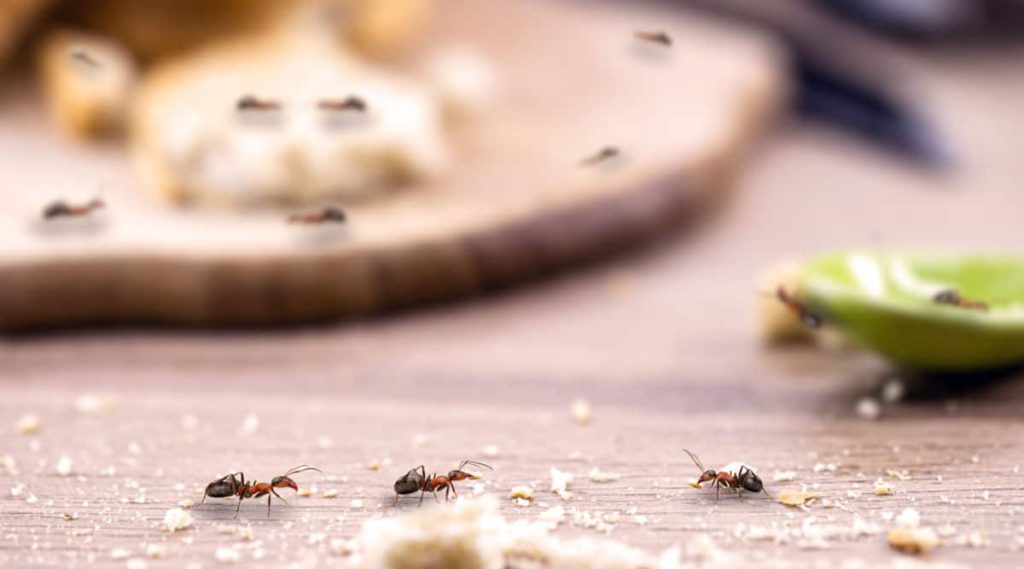You’ve baked a tasty sweet treat and left it out to cool on your kitchen counter to enjoy it later. Next thing you know, your kitchen is swarming with ants! This can be frustrating because once ants have invaded your house, they are persistent little things, and it can be hard to get rid of them. However, hope is not lost – and there are multiple methods of discouraging ants from sticking around. Perhaps you want to take a more natural approach to get rid of ants without all the harsh chemicals. In that case, look no further – simply try out our handy tips below, and your kitchen will be rid of ants in no time!
Why do I have ants in my kitchen?
Your kitchen is the most commonplace in your house, where you’ll find ants because they seek out resources such as food and water to keep their colony alive. No matter how dedicated you are to cleaning up crumbs when they happen, you’ll inevitably miss some. Ants are also attracted to food sources that you may not realise. Pet bowls are the perfect attraction to ants. To minimise the risk of ants swarming your pet’s bowls, you should throw away uneaten food or seal it in a container. Make sure to regularly clean the area around your pet’s food bowls – after all, pets aren’t the tidiest eaters! To prevent ants from getting into your pet’s food bowl, place the food bowl in a slightly larger bowl. Fill the larger bowl with water, creating a moat that ants can’t easily cross.
Your bin is also a significant attractor of ants because it contains all the yummy food scraps that ants are always looking for. Make sure your bin has a lid, so ants don’t have access to the inside. Similarly, making sure that the food in your pantry is stored correctly is an excellent way of preventing an ant invasion. Ants are primarily attracted to sweet things, so making sure to get rid of any overly-ripe fruit that may be sitting on your counter also helps prevent ants. These methods can also prevent other pantry pests such as moths, beetles, and weevils.
Things to know about ants in your kitchen
1. They don’t cause damage to your house
Nobody wants ants in their kitchen! Here’s the good news: ants don’t pose any significant risk to you or your home. Although annoying, they don’t bore through wood or cause any structural damage to your home. Phew!
2. You can usually follow the source
Most often, ants in the kitchen are coming from somewhere and travelling somewhere. By paying attention to their trail, you can usually identify the food source that is attracting them. The likelihood is that it’s just a tiny spill or some food crumbs, which can easily be eliminated with a damp cloth.
3. Ants are seasonal
Ants most commonly spike in the spring and summer when the weather is at its warmest. The increase in temperature also increases their activity, driving them into your home in large numbers. By knowing when an ant invasion is most likely to occur, you can make sure you’re prepared!
4. They are difficult to control
Unfortunately, ants can easily enter your home through the tiniest of openings – and once they’re in your house, they’re difficult to get rid of. In this blog, we will provide plenty of handy methods to help you get rid of ants from your kitchen. However, if you have ongoing ant problems, seek the help of a professional pest control company that will offer long-term solutions to keep your home ant-free.
Methods of removing ants from your kitchen

Using chalk
One of the most effective methods for keeping those pesky ants away is chalk! Chalk contains calcium carbonate, which helps to repel ants. All you need to do is spray some powdered chalk in the ants’ entry point or draw a chalk line at the entrance. Although it’s not clear exactly why chalk stops ants from coming into the house, it’s effective!
Using lemons
Everyone knows that ants love all things sweet. At the same time, they hate sour things, so lemons are your best friend when it comes to getting rid of ants. You can wash your kitchen floors with water with a bit of lemon added, which will help keep ants away as they don’t like the smell. Make sure to avoid leaving out anything sweet, which may attract the ants – and leave the lemon peels on your kitchen counter to let them work their magic.
Using oranges
Another citrus fruit that ants hate is oranges. You can easily make a paste with one cup of water and a few orange peel pieces and spread this paste around ants’ entryways and wipe it clean afterwards. You can also place orange peels on the kitchen counter or anywhere you’re having ant problems and let them repel the ants.
Using pepper
Ants particularly hate cayenne and black pepper. Sprinkling a bit of pepper around the areas you’re noticing an ant problem can help deter them from entering your house. Although pepper won’t kill them, it will irritate them enough to avoid returning.
Using salt
Although huge fans of sugar, ants are very adverse to salt. This means that to deter them, you can mix a solution of water and dissolved salt and spray it onto your kitchen surfaces to protect them from ants. Make sure to use ordinary table salt rather than health-boosting rock salt. You can even spread a line of salt across your countertops, walls, or walkways to prevent ants from entering. It’s worth noting that sometimes ants are willing to cross salt lines if there is a tasty treat on offer, but you can counter this by making your lines of salt wider.
Using saltwater spray
Similar to the suggestion above, it is also possible to mix up a strong saltwater solution and spray it directly on the ants. Salt dries out the exoskeleton of the insects, thereby killing them. However, there are a few downsides to this method. Salt corrodes surfaces it comes in contact with, and you may risk damaging the surface on which you spray it. More specifically, it may tarnish wall paint, floor finishes, and metal fixtures – and possibly kill sensitive plants if used in the garden.
Using boiling water
Using boiling water to kill ants is a chemical-free solution for those looking to take a natural approach to get rid of these pests. If you notice ant hills near your home, you can pour boiling water in them, which will kill many of the ants inside, therefore preventing them from invading your house. However, the boiling water won’t be enough to kill off the entire colony. You should make sure to treat every ant hole you see in proximity to your home.
Non-toxic ant deterrents
You can also defend your home with natural scents and substances that ants don’t like. You can consider a combination of vinegar, peppermint oil, cinnamon, cayenne pepper, whole cloves, or bay leaves. But, be careful – make sure to place your deterrents out of reach of curious pets or children.
Tips for an ant-free kitchen
Although the above methods are effective for removing ants from your kitchen, there are several preventative measures you can take to stop ants from invading your kitchen in the first place.
1. Don’t leave dirty dishes in the sink
It can be tempting to leave your dirty dishes in the sink to worry about tomorrow after a long day. However, the remnants of food left on your dishes can be a source of attraction for ants. Instead, try to clean them up after every meal or load them into the dishwasher.
2. Take the trash out every day
Most likely, you’ll have food scraps in your garbage, which is a source of temptation for ants. To eliminate this problem, it’s a good idea to empty your trash cans every day. You should also try to store your garbage bins far from your house to avoid ants entering.
3. Clean your house regularly
Make sure to be extra vigilant about cleaning up crumbs from your home. Don’t forget about areas such as under and around appliances in your kitchen, in couch cushions, and any other areas where your family eats or prepares food. When they enter your house, ants leave behind scent trains for other ants to follow. A safe way to get rid of these trails is to use a spray of water and cinnamon or cayenne pepper.
4. Keep food tightly sealed in containers or plastic bags
This is particularly important for sweet or starchy foods such as sugar, honey, and cornmeal, which ants are most attracted to. Open containers of food such as cereal boxes should be stored in air-tight containers or secured with a bag clip.
5. Seal off all entryways
Ants can squeeze their way through the tiniest of openings. They can easily find doorways to your home that you may not have even noticed. By following the trail of ants, you’ll be able to find where they’re entering from. As soon as you find any entry holes, seal them with silicone caulk, putty, glue or plaster. An alternative is to line your kitchen with double-sided tape, which will stop the ants in their tracks when they try to enter your kitchen.




